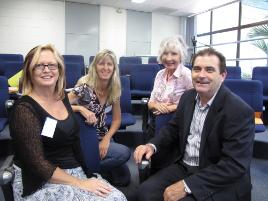Discipline-based researchers focus on learning
Published on 09 November, 2009
Researchers who have previously focused on their discipline are being encouraged to diversify into research of how students learn their discipline.
And that, according to CQUniversity engineering educator Dr Prue Howard, can be a "very, very different thing".
Dr Howard, a representative of the Australasian Association of Engineering Education, was among presenters working with 30 participants at an 'OctoberVET' workshop, hosted by CQUniversity's Learning and Teaching Education Research Centre (LTERC).
Academics from a range of disciplines came from as far afield as Mackay, Gladstone and Bundaberg campuses to attend the event at Rockhampton Campus on November 5.
Guest presenter Terry O'Hanlon-Rose presented in his capacity as Vice-Chair of the vocational education and training teachers' peak body (VETNetwork Australia) and Southern Cross University's Dr Roslyn Cameron came along to share her research methodology about learners in transition and 'mixed methods'. CQUniversity engineering lecturer Dr Llewellyn Mann was also a presenter.
Dr Howard said academics were encouraged to take a more scholarly approach to developing their education, to be serious about research about teaching and to favour evidence-based changes to practice.
"We have engineering educators who have typically come into academia through their discipline and research in their discipline and now needing to make the transition into research of education of their discipline," she said.
LTERC's Director, Associate Professor Bobby Harreveld said the OctoberVET workshops are an initiative of AVETRA, the Australian Vocational Education and Training Research Association.
"AVETRA encourages informal research workshops throughout regional and rural Australia and these are organised by members to engage the local community with issues around research in vocational education and training," Dr Harreveld said.
Dr Harreveld said the workshop aimed to give each participant a trigger to develop their own research questions by examining real scenarios involving learners in transition, across the settings of formal education, workplace training and work.
"We are helping the academics to 'transition' into research about education," she said.


